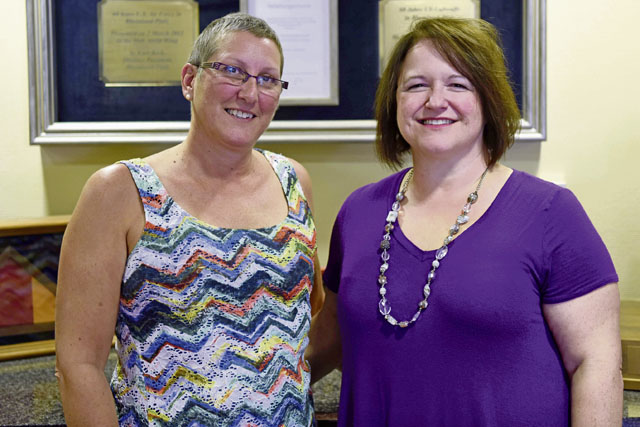
October was Breast Cancer Awareness Month.
In honor of this, two courageous women told their stories of pain and perseverance in their battle with breast cancer.
According to the American Cancer Society, breast cancer is the second leading cause of cancer-related deaths in women, exceeded only by lung cancer. Also, 1 in 8 women in the U.S. will develop invasive breast cancer during their lifetime.
Maria Moore, a military spouse, and Canadian Navy Petty Officer 1st Class Yvonne Keneford, NATO staff assistant, reflected on their initial diagnosis, treatment, and rebuilding their lives.
“I was diagnosed with breast cancer in November of 2016, and I had my surgery Jan. 4, 2017,” said Moore. “They detected it through a mammogram; It was a very tiny spot they weren’t too concerned about, but after a biopsy, I found out it was cancer.”
Moore opted to have the breast cancer removed but kept both her breasts.
“The breast cancer was farther along than they thought,” she said. “Had I not acted quickly, opted for the cancer removal and the reduction in lift, they would have had to remove the left breast.”
Moore had radiation treatment, but did not require chemotherapy.
Moore has been cancer free since early 2017. She will need breast reconstruction, but the cancer has not come back.
“After an experience like this, you see things differently,” Moore said. “The little things don’t bother you because you know life is too short to not enjoy it.”
Moore had been getting regularly checked for breast cancer since the age of 40. She had no history of breast cancer in her family but was diagnosed at age 48.
“My message to women is get the the mammogram,” she said. “Your insurance covers it. It’s uncomfortable, but the temporary discomfort is worth catching the cancer early. To women who have been diagnosed with breast cancer, I would just say keep the faith, smile and laugh, and ask for help. Don’t try to do it on your own.”
Keneford was diagnosed with breast cancer in February.
She was at a gym in 2017 and hit her breast with a barbell, while bench-pressing.
A few days later she felt a lump on her breast. She didn’t think anything of it, but after a while, it didn’t go away.
“In February, I got a mammogram, found out it was cancer, and three weeks after the diagnosis I was in surgery,” said Keneford.
Keneford said her father and sister had recently passed away from cancer, so one of the hardest things she has ever had to do was tell her family she had it.
Because there was a high probability of the cancer returning, Keneford had both breasts removed as a precaution.
“Both my breasts have been removed, I’ve been through chemotherapy, lost my hair, put on 50 pounds, and now I’m going through reconstruction therapy,” said Keneford. “But my feet are planted every morning, and I’m grateful for that.”
Doctors realized if they hadn’t caught the cancer early, it would have moved to her pectoral muscles, which would have made it a lot harder to treat, said Keneford.
Most of Keneford’s family is still in Canada, but some of her family came to Germany to help her after the surgery and during chemotherapy.
Tearing up, Keneford said, “This experience has made me extremely humble because I’m a very strong person and wanted to get through this process on my own, but I realized I would have to rely on people, even for the simplest task.”
Though not finished with treatment yet, Keneford said she sees the light at the end of the tunnel.
When asked if she had any words of wisdom for women, Keneford said: “My advice would be to take advantage of the mammograms. Women should be constantly checking their breasts, and if something is found, go get it checked out.”
Early detection is the best prevention. Women from 45 to 54 should get mammograms every year, especially if there is a history of breast cancer in their family. Women 55 and over are recommended to get them every other year.
According to the American Cancer Society, cancer survivorship has tripled over the past 60 years, and there are approximately 2.8 million breast cancer survivors in the U.S.
For more information on treatment, prevention and support groups for breast cancer, contact U.S. Air Force Maj. Debra Santos, 86th Medical Group health care integrator and disease manager at 479-2292 or 06371-46-2292.


